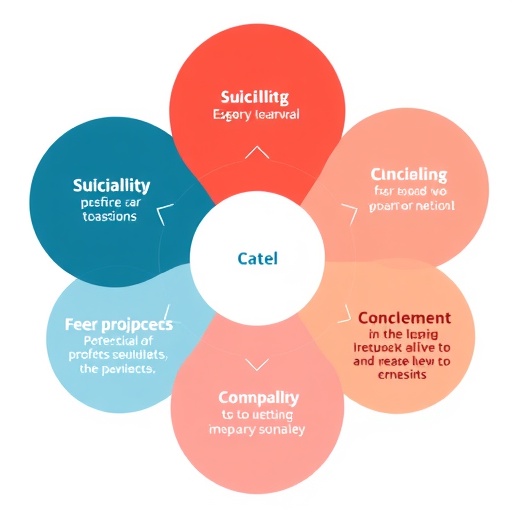In a groundbreaking systematic review published in BMC Psychiatry, researchers have unveiled critical insights into the complex relationship between mild cognitive impairment (MCI) and suicidality, shedding light on a largely understudied yet profoundly consequential mental health issue. MCI, a clinical condition that straddles normal cognitive aging and the onset of dementia, is increasingly recognized not only for its cognitive symptoms but also for its serious psychological and social ramifications. This comprehensive analysis synthesizes current scientific evidence, offering a nuanced understanding of how cognitive decline intersects with suicide risk factors.
Mild cognitive impairment characteristically presents as a noticeable decline in cognitive functioning that is more significant than typical age-related changes, but not severe enough to warrant a diagnosis of dementia. Researchers emphasize that aside from memory deficits, individuals with MCI often grapple with functional impairments and social withdrawal. These elements collectively may catalyze emotional distress, which, as the review suggests, significantly elevates the likelihood of suicidal thoughts and behaviors (STB) within this vulnerable population.
The meticulous review process involved screening over a thousand scientific publications sourced from premier electronic databases including PubMed, Scopus, Cochrane Library, Web of Science, and EMBASE, with literature up to June 2024 being considered. Only eleven studies met the stringent eligibility criteria, indicating a scarcity of high-quality data focusing explicitly on suicidality within MCI cohorts. Yet, the synthesis of available data provides compelling evidence of increased STB prevalence among those formally diagnosed with MCI compared to their cognitively intact peers or even individuals with more advanced dementia.
One salient finding of the review is the marked influence of comorbid psychiatric disorders on suicide risk in MCI patients. Depression, in particular, emerges as a frequent and potent cofactor, amplifying psychological pain and hopelessness which are well-known precipitants of suicidality. Similarly, the presence of other chronic health issues such as cardiovascular diseases compounds overall vulnerability, suggesting that suicide prevention strategies must adopt a holistic approach addressing both mental and physical health dimensions.
Socioeconomic determinants also play a pivotal role, as individuals with MCI who possess lower educational attainment and belong to disadvantaged economic strata exhibit a disproportionately higher suicide risk. This correlation highlights the intricate interplay between cognitive decline and social determinants of health, underscoring the necessity for integrated care frameworks that transcend traditional medical treatment, encompassing social support systems and educational interventions.
Methodologically, the review’s use of standardized quality appraisal tools — including the Newcastle–Ottawa Scale and the Cochrane Risk of Bias in Non-randomized Studies of Exposure (ROBINS-E) — ensures that findings are rooted in robust and critically assessed evidence. While study quality ranged significantly, the median quality score represented moderate validity, affirming the need for more rigorous longitudinal and interventional studies to dissect causal mechanisms and effective prevention modalities.
The revelation that MCI itself is a distinct risk factor for suicidality challenges prevailing assumptions that cognitive decline might universally diminish suicide likelihood due to decreased capacity or intent. Instead, the nuance lies in the intermediate severity of impairment, where preserved insight into cognitive deterioration may amplify despair and existential suffering. This insight directs clinical attention to the unique psychological profile of MCI patients, who might otherwise be overlooked in suicide risk assessments dominated by dementia-focused paradigms.
Moreover, the review advocates for suicide prevention programs tailored specifically to older adults with mild cognitive impairment. Experts argue for integrated health and social care models that simultaneously address cognitive symptoms, comorbid mental health conditions, and socioeconomic challenges. Such multidisciplinary interventions could include enhanced screening for depression and suicidal ideation, proactive cardiovascular risk management, and social engagement initiatives aimed at reducing isolation.
Intriguingly, the societal implications of the findings extend beyond clinical settings. As the global population ages, the prevalence of MCI is anticipated to rise, potentially escalating the public health burden of suicide among older adults. Policymakers and healthcare systems must thus prioritize age-appropriate mental health services that are both accessible and attuned to the complex needs presented by cognitive impairment.
The study also opens avenues for neuroscientific exploration into the biological underpinnings linking cognitive dysfunction and suicidality. Emerging hypotheses suggest that neurodegenerative changes affecting mood regulation circuits, compounded by systemic inflammatory processes often seen in MCI, might mechanistically bridge these phenomena. Future research incorporating neuroimaging and biomarker analyses may yield transformative insights guiding targeted therapeutics.
In conclusion, this systematic review represents a crucial advancement in psychiatric geriatrics, emphasizing that even mild stages of cognitive decline carry profound risks for suicidal ideation and behavior. By delineating contributing clinical and socioeconomic factors, the study paves the way for more nuanced, evidence-based interventions. It calls for a paradigm shift in how clinicians, caregivers, and health systems perceive and respond to suicidality in the context of aging and cognitive impairment, with the ultimate goal of mitigating preventable tragedies among this susceptible demographic.
Subject of Research: The relationship between mild cognitive impairment (MCI) and suicidality, including contributing clinical and socioeconomic factors.
Article Title: Suicidality among people with mild cognitive impairment: a systematic review
Article References: Sánchez-Gil, A., Pérez, J., Navarro-López, V. et al. Suicidality among people with mild cognitive impairment: a sustematic review. BMC Psychiatry 25, 782 (2025). https://doi.org/10.1186/s12888-025-07228-x
Image Credits: AI Generated
DOI: https://doi.org/10.1186/s12888-025-07228-x




